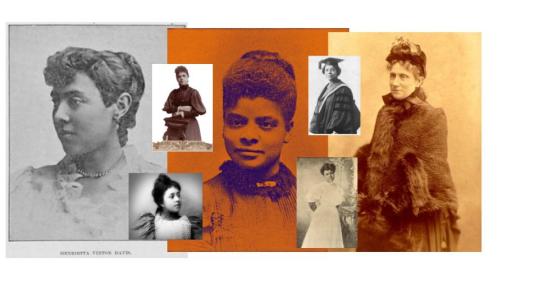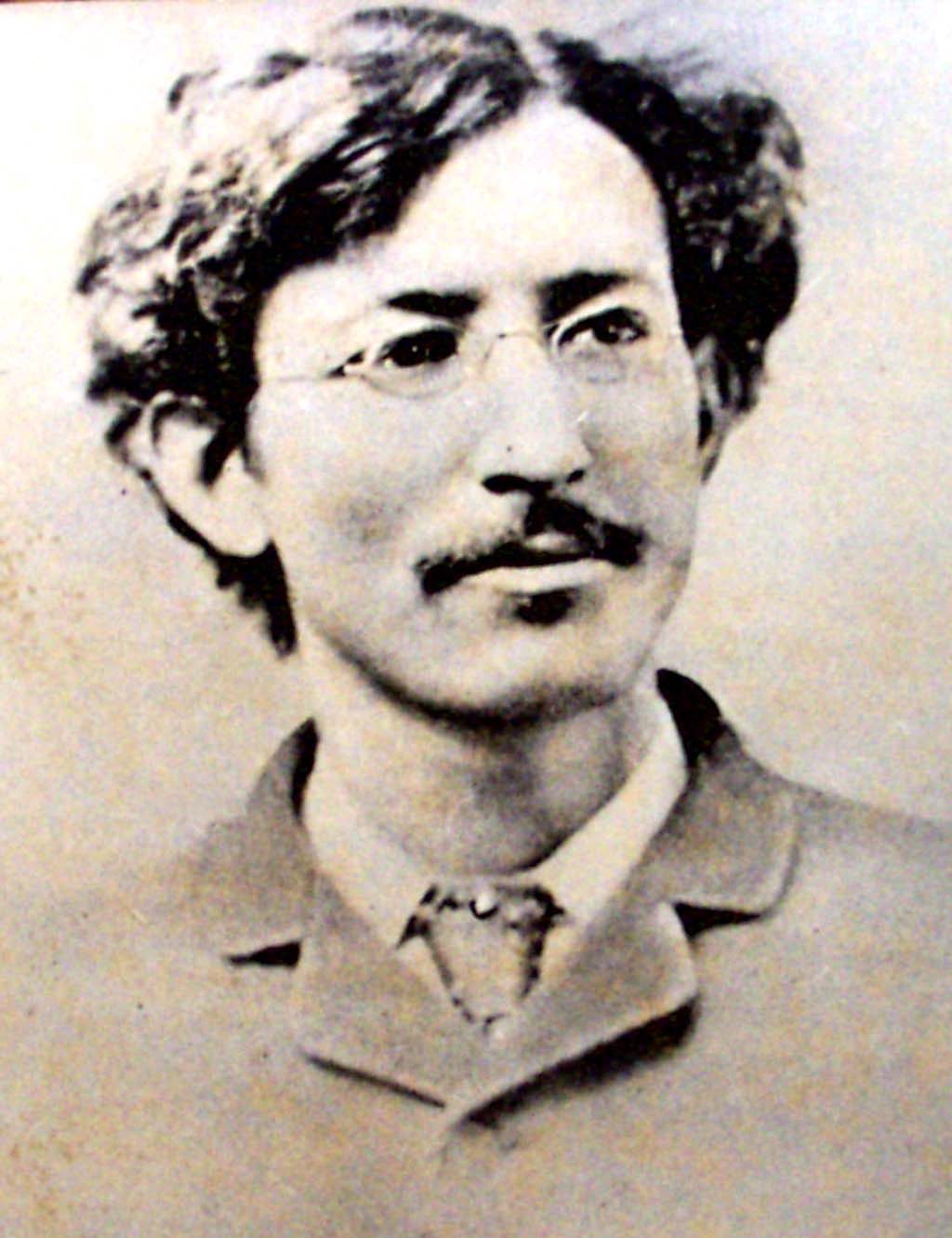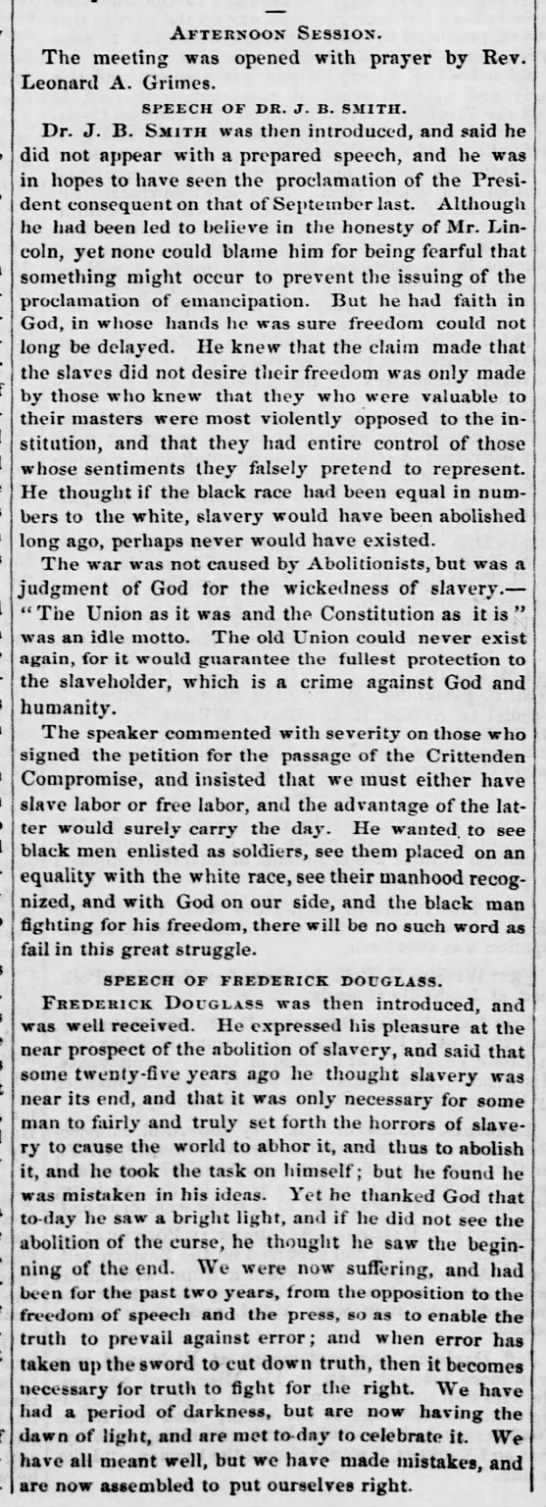Archive for January, 2020
Walking Tour: Women Activists of Cedar Hill (Sat., February 15, 2020 @ 11:30 AM)
Posted by jmullerwashingtonsyndicate in Uncategorized on January 27, 2020
 Learn and discuss the lost local and international history of the reformist women activists of Cedar Hill in the fields of education, arts, journalism, business and politics that worked alongside Frederick Douglass across generations & geography.
Learn and discuss the lost local and international history of the reformist women activists of Cedar Hill in the fields of education, arts, journalism, business and politics that worked alongside Frederick Douglass across generations & geography.
Meet the poets, actresses, musicians, principals, lawyers, seamstresses, journalists and women reformists, including the Honorable Miss Gladys Parham, who have inhabited the sacred space of Cedar Hill from the years of Frederick Douglass to the decades of preservation activism which secured the home and grounds as a flagship of the National Park Service.
Learn about women from the Eastern Shore to Paris to around the corner who have made contributions to the residual history of Cedar Hill and the neighborhood of Old Anacostia.
Questions and photography are encouraged throughout the walking tour!
T. Thomas Fortune sends telegram in wake of passing of Frederick Douglass (Feb. 21, 1895)
Posted by jmullerwashingtonsyndicate in Uncategorized on January 27, 2020

T. Thomas Fortune reads poem at unveiling of Frederick Douglass Monument in Rochester (1898)
Posted by jmullerwashingtonsyndicate in Uncategorized on January 18, 2020
 POEM BY MR. T. THOMAS FORTUNE.
POEM BY MR. T. THOMAS FORTUNE.
In introducing T. Thomas Fortune, of New York, editor of The Age, one of the leading papers published in the interest of his race. Mr. Thompson paid a fitting tribute to his abilities and his earnest efforts to secure the erection of the monument.
Mr. Fortune read an original poem, entitled, “Frederick Douglass”
The poem follows:
We cannot measure here the dizzy heights he trod
To whom this glyptic shaft is lifted from the sod,
Towards the matchless azure of sweet Freedom’s skies,
If we forget the depths whence God bade him arise,
Above the slave’s log cabin and a sireless birth,
To be a prince among the children of the earth !
No giant who has placed one foot upon the land
And one upon the sea, with power to them command,
To bid the angry turbulence of each be still,
And have them bend obedient to his master’s will —
Ever started lower in the social scale than he —
This Champion of the Slave, this Spokesman of the Free !
In him the deathless lesson of one common race
Was taught anew — the lesson you who will may trace
From Babel’s fatal tower to fateful Waterloo —
From Eden’s blest abode to slavery’s Tuckaho —
That still “one touch of nature makes the whole world kin,”
The world of love and joy, the world of woe and sin.
But such as Douglass was not born to wear a chain —
At the slave’s task to bend and cower and cringe and
strain —
To bare his princely back to the rude lash whose welt
Produced no pain that his proud soul must have felt !
As Moses did, he served in bondage for an hour
The better to be armed to crush the master’s power.
It has been ever thus since the old world was young —
The giants of the race from the head of woe have sprung —
Out of the agony and sweat and rayless hope
In which the swarming masses have been doomed to grope.
So lifts its head from rocks and sands the lighthouse brave,
To guide the fearless sailor o’er the treacherous wave.
For who can sing of woe who never felt a pain —
Who never hoped ‘gainst hope to know a joy again?
Who thirst for vengeance on the skulking, coward foe
As he whose sire or mate has fallen ‘neath the blow?
Who feel the venom of the slave’s undying hate
As lie whose lot has been the slave’s degrading fate?
 ‘Twas a long way to the north star from Tuckaho —
‘Twas a long way to the north star from Tuckaho —
From slavery’s dark shade to freedom’s electric glow —
From out the depths — “O the depths !” — of slavery’s long
night —
To the high altitude of freedom’s fadeless light !
And here he stood in winter’s storm and summer’s sun,
Majestic, brave, till the fierce war was fought and won.
We claim him as our own, the greatest of the race,
In whom the rich sun stamp of Africa you trace,
And we delight to place upon his massive brow
Affection’s crown of reverence, as we do now.
But, in a larger sense, forsooth, did he belong
To all the race, a prophet strong among the strong !
For he was large in stature and in soul and head
True type of New America, whose sons, ’tis said,
The western world shall have as glorious heritage —
That they shall write in history’s fadeless, truthful page
Such deeds as ne’er before have wrought for liberty
And all the arts of peace — the strongest of the free !
And every depth he braved, and every height he trod
From earth’s alluring shrines to the presence of his God;
And he was cheered by children’s confidence and trust,
A tribute never withheld from the true and just;
And woman’s sympathy was his, the divine power
That rules the world in calmest and stormiest hour !
To him all weakness and all suffering appealed;
‘Gainst none such was his brave heart ever steeled.
And pleading womanhood for honest rights denied
No champion had of sturdier worth to brave wrong’s pride —
To claim for her in all the fullest measure true
Of justice God ordained her portion, as her due.
He needs no monument of stone who writes his name
By deeds, in diamond letters, in the Book of Fame —
Who rises from the bosom of the race to be
A champion of the slave, a spokesman of the free —
Who scorns the fetters of a slave’s degrading- birth
And takes his place among the giants of the earth.
This shaft is lifted high in Heaven’s holy air
To keep alive our wavering hope, a message bear
Of inspiration to the living from the dead,
Who dared to follow where the laws of duty led,
They are so few — these heroes of the weak and strong —
That we must honor them in story and in song.
So let this towering, monumental column stand,
While freedom’s sun shall shine upon our glorious land,
A guiding star of hope divine for all our youth,
A living witness to the all-enduring truth —
The living truth that makes men brave to death, and true —
The truth whose champions ever have been few —
The truth that made the life of Douglass all sublime,
And gave it as a theme of hope to every clime !
Mr. Fortune’s poem was followed by an excellent violin solo by Joseph Douglass, of Washington, a grandson of Frederick Douglass. The older members of the audience, who remembered the great freedman’s love for music, and his own proficiency in the use of the violin, recalled many instances and greeted the young player with enthusiasm.
He played a selection from Verdi’s “II Trovatore.”
SOURCE:
An Authentic History of the Douglass Monument; Biographical Facts and Incidents in the Life of Frederick Douglass (1903)
Editor’s NOTE:
More information on the radical friendship of Frederick Douglass and T. Thomas Fortune across generations and geography will be shared February 8, 2020 at the T. Thomas Fortune Foundation and Cultural Center. See you soon!
Brief note on radical abolitionists and UGRR conductors Rev. Leonard A. Grimes (1815 – 1873) & Frederick Douglass
Posted by jmullerwashingtonsyndicate in Uncategorized on January 15, 2020

A plaque at 22nd & H Street NW recognizes Rev. Grimes. Photo by author.
At the northeast corner of 22nd & H Street NW, within the campus of George Washington University, rests a plaque recognizing Rev. Leonard A. Grimes, an abolitionist, conductor on the Underground Railroad, recruiter for the 54th Massachusetts Volunteer Infantry and confidant of Frederick Douglass.
In 2007 the plaque was installed to recognize the corner as being the residence of Rev. Grimes from 1836 to 1846.
According to the National Park Service:
“[Grimes] became a hackman in the District of Columbia and discovered that his profession provided the perfect cover for such illegal activity. He contributed to an unknown number of escapes before he was finally arrested and convicted,”
 Following his release from prison in Virginia for aiding fugitive slaves, Grimes moved to New Bedford, Massachusetts, where the Douglass family was well-known.
Following his release from prison in Virginia for aiding fugitive slaves, Grimes moved to New Bedford, Massachusetts, where the Douglass family was well-known.
During the early 1850s Rev. Grimes played a pivotal role in the fugitive slave case of Anthony Burns, which was a national and international news sensation.
An 1856 account of the case says thusly:
The extradition of Anthony Burns as a fugitive slave was the most memorable case of the kind that has occurred since the adoption of the Federal Constitution. It was memorable for the place and for the time of its occurrence; the place being the ancient and chief seat of Liberty in America, and the time being just the moment when the cause of Liberty bad received a most wicked and crushing blow from the hand of the Federal Government. It was memorable also for the difficulty with which it was accomplished, for the intense popular excitement which it caused, for the unexampled expense which it entailed, for the grave questions of law which it involved, for the punishment which it brought down upon the head of the chief actor, and for the political revolution which it drew on.
…
The Rev. L. A. Grimes bore a large share in the transactions here narrated, and I have relied chiefly upon his authority in recounting such matters as came within his personal cognizance.
Rev. Grimes and Frederick Douglass shared the same cause and united in the same spaces several times before Grimes passed in 1873.

“Emancipation Day in Boston.” The Liberator, 16 January, 1863. p 4.
In January of 1863 Douglass and Grimes, as well as countless abolitionists and reformists, shared the stage at Tremont Temple in Boston to recognize the issuance of President Abraham Lincoln’s Emancipation Proclamation.
Grimes and Douglass, and others, would subsequently activate their networks to advocate for the enlistment of “Colored Troops” in the Union war effort, specifically the Massachusetts 54th Volunteer Infantry.
In order to move beyond the limiting mythology and incomplete scholarship that has restrained Douglassonian Studies from developing an infrastructure similar to that which exists for Mark Twain or Abraham Lincoln, we must begin to elevate the networks and associations of all those who worked on the front lines to abolish the institution of slavery and advocate for greater reforms of equality and Civil Rights for all.
“Frederick Douglass on the Eastern Shore and Cecil County” @ Cecil College – Career & Community Education, Sat., March 7, 2020
Posted by jmullerwashingtonsyndicate in Uncategorized on January 10, 2020

This course explores the local history of Frederick Douglass through the Delmarva Peninsula with special emphasis on Cecil County, Maryland.
Class will offer an introduction to the biography of Frederick Douglass, one of the foremost leaders in the American Abolitionist Movement during the Civil War and Reconstruction periods of the 19th century. Discussions include the extensive travels and visits of Douglass throughout the Delmarva from Salisbury in Wicomico County to Centreville in Queen Anne’s County to Rising Sun in Cecil County.
Topics include consequential visits, connections and influences, religious communities, political and educational leaders, local history, slavery, American
Abolitionist Movement, African American communities in the 19th century, and
development of the transportation infrastructure in Cecil County.
Notes:
Lecture will be held from 9am – 1pm.
Lunch in Port Deposit from 1:30 – 2:30pm.
Followed by walking tour of Port Deposit.
Students must be physically able to do walking tour for full two hours
Instructor: Muller
1 session, 6.5 hours
$69 persons under 60. $25 MD residents
over 60 (GZH620). $5 Senior Network
Members (SZH620).
Sec# Day Dates Times Location
01D S 3/7 9-1p PE E221
01D* S 3/7 2:30-4:30p Offsite
*01D – Tour of Port Deposit
Spring 2020 Course Schedule: PDF
https://www.cecil.edu/programs-courses/career-community-education/lifelong-learning